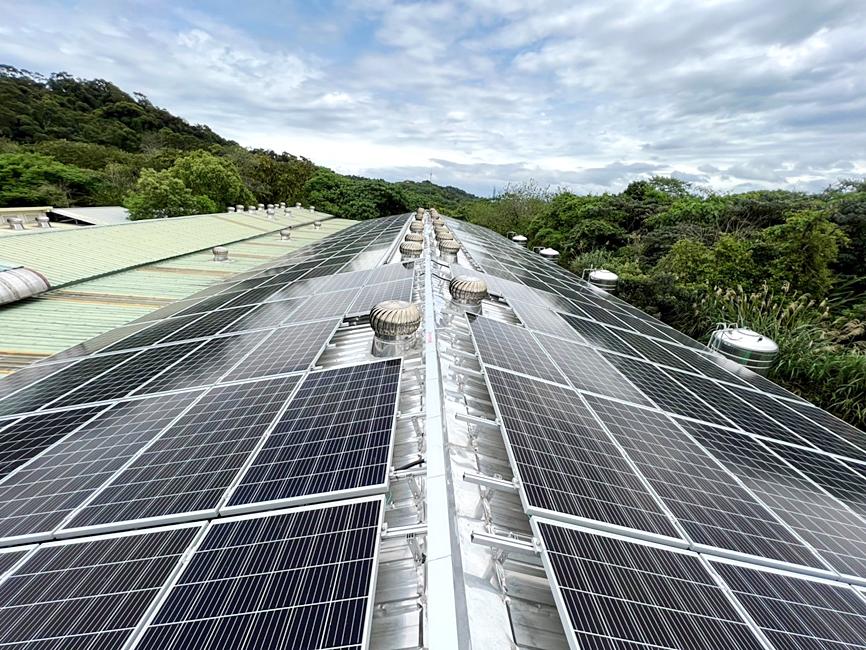An animal shelter in New Taipei City’s Jhonghe District (中和) has become the city’s first to use solar panels, bringing a yearly savings in utility costs that could buy 840kg of dog food, the New Taipei City Animal Protection and Health Inspection Office said on Friday.
Solar panels were last month installed on nearly 1,000m2 of the shelter’s roof last month, thanks to a joint venture between the city government and a photovoltaic company, the agency said in a statement.
The solar panels have been made of semiconductive material that uses sunlight to generate electrical energy in a process that does not emit carbon dioxide or other greenhouse gases, agency deputy director Huang Chia-wen (黃嘉文) said.

Photo courtesy of New Taipei City Government Animal Protection and Health Inspection Office
The project helps the agency contribute to Taiwan’s efforts to cut carbon emissions, while having a cooling effect on the shelter, she said, adding that the solar panels have improved the shelter’s insulation and air circulation in the dog pens.
The panels are powering air-conditioners, which would lower the temperatures in the dog pens by 3°C to 5°C during the summer, shelter veterinarian Huang Chih-ting (黃繼霆) said.
The solar cells can generate 76,000 kilowatts of power and cut carbon emissions by 38,000 tonnes, which is equivalent to planting 3,199 trees, she said.
The green energy project has enabled the shelter to get value out of unused floor space, improve conditions for the animals and protect the environment, she added.

CHANGING LANDSCAPE: Many of the part-time programs for educators were no longer needed, as many teachers obtain a graduate degree before joining the workforce, experts said Taiwanese universities this year canceled 86 programs, Ministry of Education data showed, with educators attributing the closures to the nation’s low birthrate as well as shifting trends. Fifty-three of the shuttered programs were part-time postgraduate degree programs, about 62 percent of the total, the most in the past five years, the data showed. National Taiwan Normal University (NTNU) discontinued the most part-time master’s programs, at 16: chemistry, life science, earth science, physics, fine arts, music, special education, health promotion and health education, educational psychology and counseling, education, design, Chinese as a second language, library and information sciences, mechatronics engineering, history, physical education

The High Prosecutors’ Office yesterday withdrew an appeal against the acquittal of a former bank manager 22 years after his death, marking Taiwan’s first instance of prosecutors rendering posthumous justice to a wrongfully convicted defendant. Chu Ching-en (諸慶恩) — formerly a manager at the Taipei branch of BNP Paribas — was in 1999 accused by Weng Mao-chung (翁茂鍾), then-president of Chia Her Industrial Co, of forging a request for a fixed deposit of US$10 million by I-Hwa Industrial Co, a subsidiary of Chia Her, which was used as collateral. Chu was ruled not guilty in the first trial, but was found guilty

DEADLOCK: As the commission is unable to forum a quorum to review license renewal applications, the channel operators are not at fault and can air past their license date The National Communications Commission (NCC) yesterday said that the Public Television Service (PTS) and 36 other television and radio broadcasters could continue airing, despite the commission’s inability to meet a quorum to review their license renewal applications. The licenses of PTS and the other channels are set to expire between this month and June. The National Communications Commission Organization Act (國家通訊傳播委員會組織法) stipulates that the commission must meet the mandated quorum of four to hold a valid meeting. The seven-member commission currently has only three commissioners. “We have informed the channel operators of the progress we have made in reviewing their license renewal applications, and

Taiwan-based publisher Li Yanhe (李延賀) has been sentenced to three years in prison, fined 50,000 yuan (US$6,890) in personal assets and deprived political rights for one year for “inciting secession” in China, China's Taiwan Affairs Office spokesman Chen Binhua (陳斌華) said today. The Shanghai First Intermediate People’s Court announced the verdict on Feb. 17, Chen said. The trial was conducted lawfully, and in an open and fair manner, he said, adding that the verdict has since come into legal effect. The defendant reportedly admitted guilt and would appeal within the statutory appeal period, he said, adding that the defendant and his family have